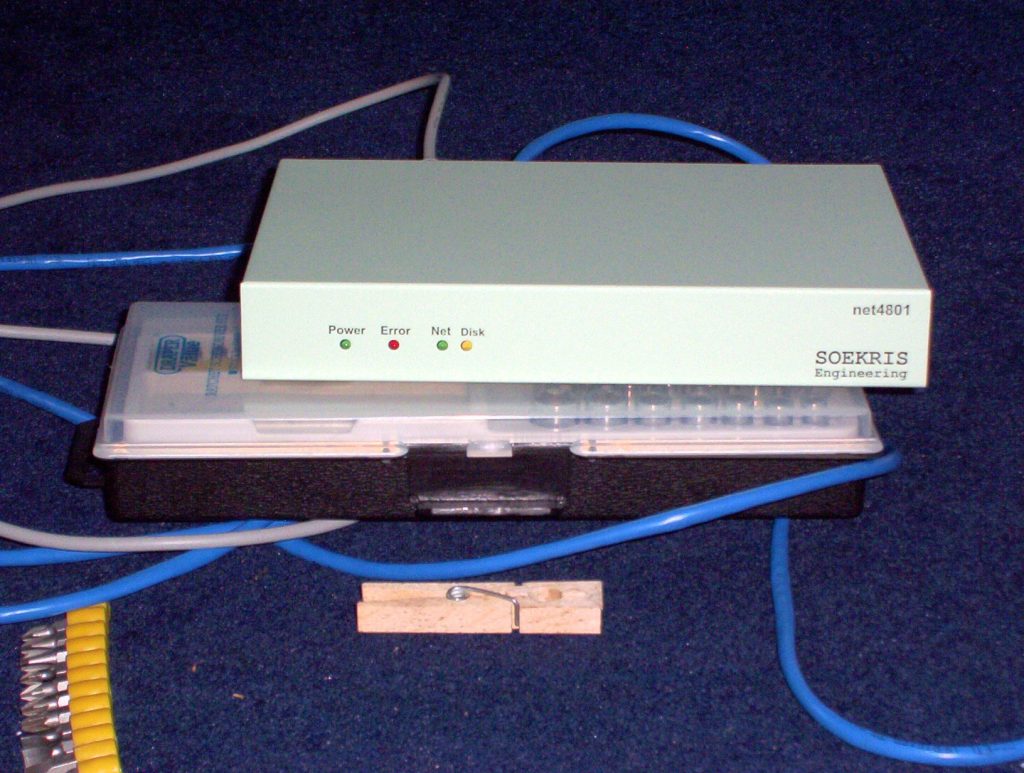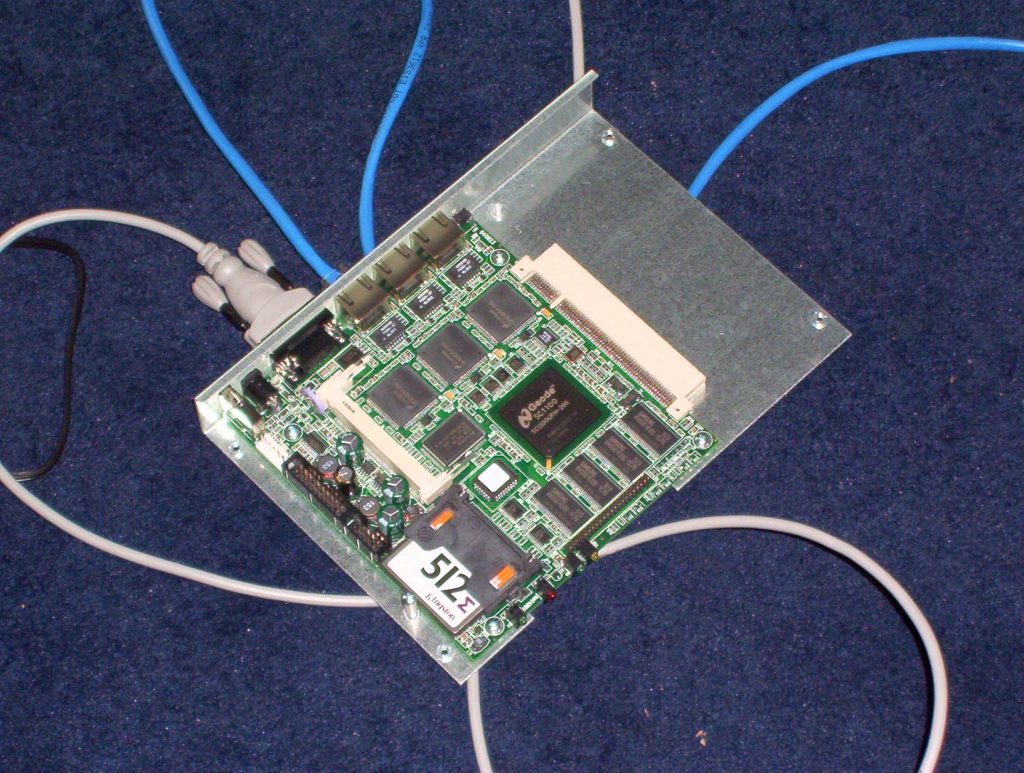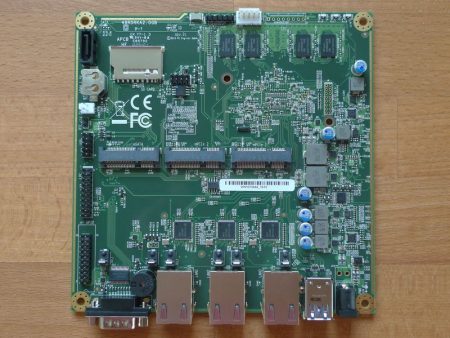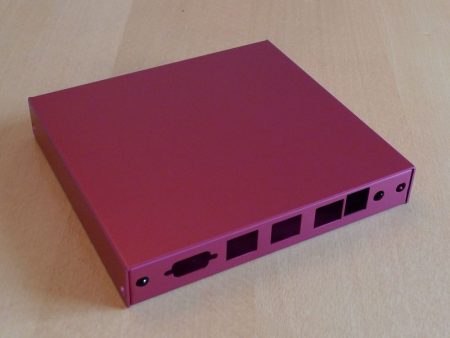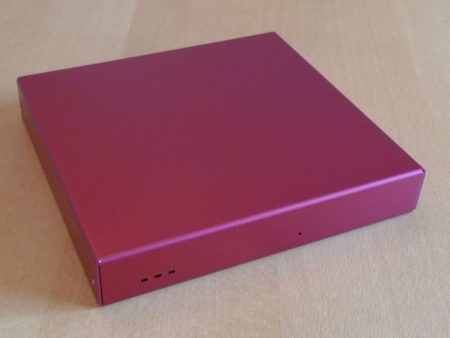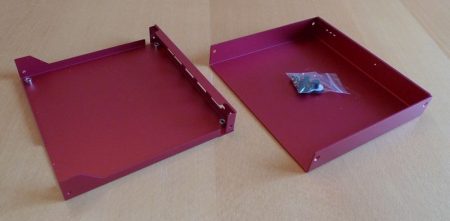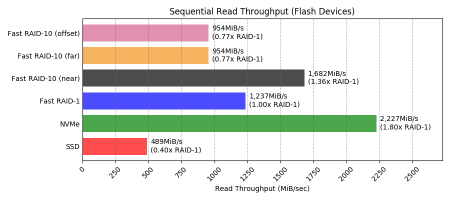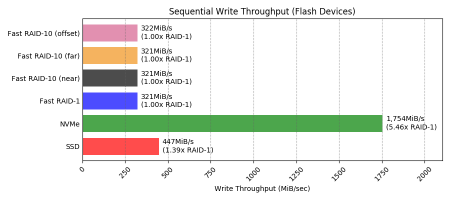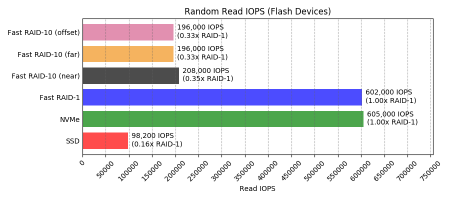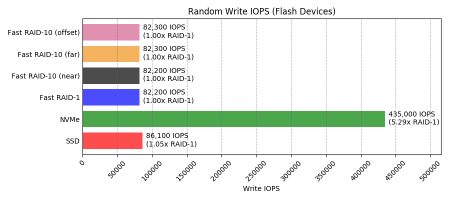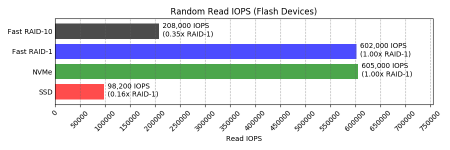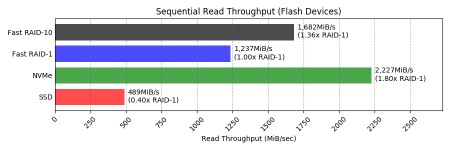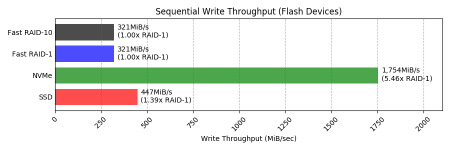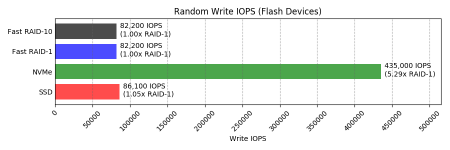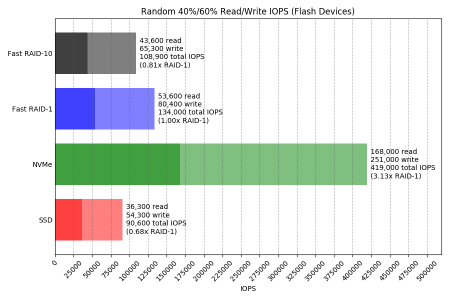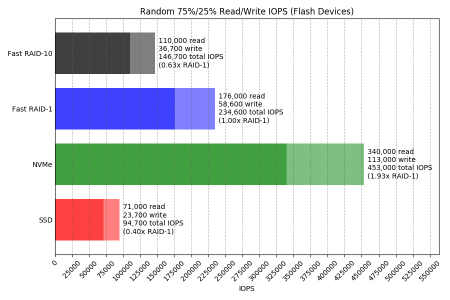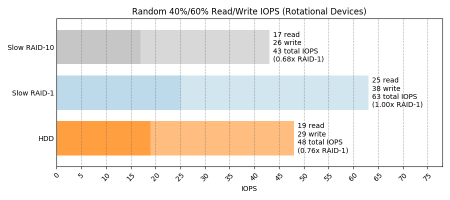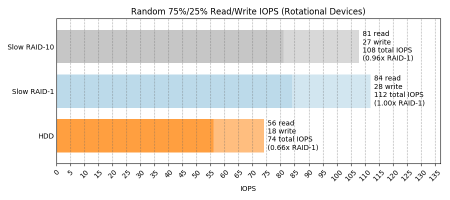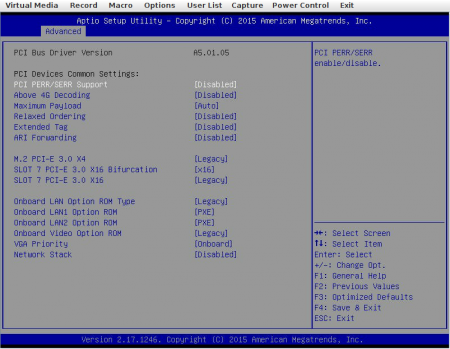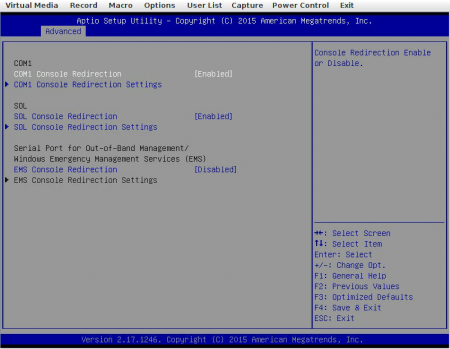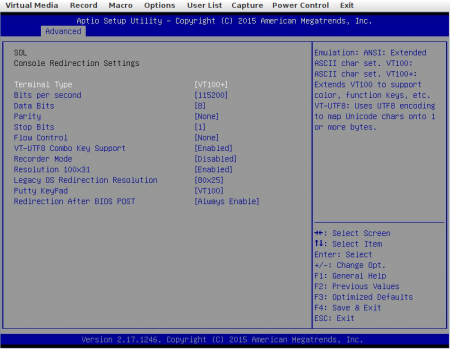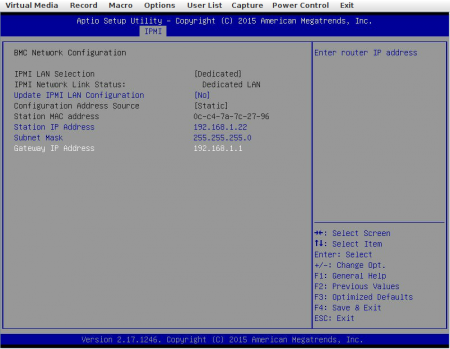ssd_seqread: (g=0): rw=read, bs=(R) 4096B-4096B, (W) 4096B-4096B, (T) 4096B-4096B, ioengine=libaio, iodepth=32
...
fio-3.13-42-g8066f
Starting 4 processes
ssd_seqread: (groupid=0, jobs=4): err= 0: pid=19203: Mon May 27 06:24:01 2019
read: IOPS=125k, BW=489MiB/s (513MB/s)(32.0GiB/66986msec)
bw ( KiB/s): min=498224, max=504592, per=100.00%, avg=501087.91, stdev=271.65, samples=532
iops : min=124556, max=126148, avg=125271.98, stdev=67.91, samples=532
cpu : usr=4.15%, sys=19.62%, ctx=1863599, majf=0, minf=162
IO depths : 1=0.1%, 2=0.1%, 4=0.1%, 8=0.1%, 16=0.1%, 32=100.0%, >=64=0.0%
submit : 0=0.0%, 4=100.0%, 8=0.0%, 16=0.0%, 32=0.0%, 64=0.0%, >=64=0.0%
complete : 0=0.0%, 4=100.0%, 8=0.0%, 16=0.0%, 32=0.1%, 64=0.0%, >=64=0.0%
issued rwts: total=8388608,0,0,0 short=0,0,0,0 dropped=0,0,0,0
latency : target=0, window=0, percentile=100.00%, depth=32
Run status group 0 (all jobs):
READ: bw=489MiB/s (513MB/s), 489MiB/s-489MiB/s (513MB/s-513MB/s), io=32.0GiB (34.4GB), run=66986-66986msec
Disk stats (read/write):
sdc: ios=2251963/0, merge=6127068/0, ticks=2247864/0, in_queue=2133512, util=100.00%
nvme_seqread: (g=0): rw=read, bs=(R) 4096B-4096B, (W) 4096B-4096B, (T) 4096B-4096B, ioengine=libaio, iodepth=32
...
fio-3.13-42-g8066f
Starting 4 processes
nvme_seqread: (groupid=0, jobs=4): err= 0: pid=19240: Mon May 27 06:24:16 2019
read: IOPS=570k, BW=2227MiB/s (2335MB/s)(32.0GiB/14715msec)
bw ( MiB/s): min= 2196, max= 2245, per=100.00%, avg=2227.14, stdev= 2.69, samples=116
iops : min=562182, max=574866, avg=570147.93, stdev=687.78, samples=116
cpu : usr=11.69%, sys=38.24%, ctx=3450565, majf=0, minf=166
IO depths : 1=0.1%, 2=0.1%, 4=0.1%, 8=0.1%, 16=0.1%, 32=100.0%, >=64=0.0%
submit : 0=0.0%, 4=100.0%, 8=0.0%, 16=0.0%, 32=0.0%, 64=0.0%, >=64=0.0%
complete : 0=0.0%, 4=100.0%, 8=0.0%, 16=0.0%, 32=0.1%, 64=0.0%, >=64=0.0%
issued rwts: total=8388608,0,0,0 short=0,0,0,0 dropped=0,0,0,0
latency : target=0, window=0, percentile=100.00%, depth=32
Run status group 0 (all jobs):
READ: bw=2227MiB/s (2335MB/s), 2227MiB/s-2227MiB/s (2335MB/s-2335MB/s), io=32.0GiB (34.4GB), run=14715-14715msec
Disk stats (read/write):
nvme0n1: ios=8350844/0, merge=0/0, ticks=1833161/0, in_queue=2068976, util=100.00%
hdd_seqread: (g=0): rw=read, bs=(R) 4096B-4096B, (W) 4096B-4096B, (T) 4096B-4096B, ioengine=libaio, iodepth=32
...
fio-3.13-42-g8066f
Starting 4 processes
hdd_seqread: (groupid=0, jobs=4): err= 0: pid=19265: Mon May 27 06:45:09 2019
read: IOPS=6696, BW=26.2MiB/s (27.4MB/s)(32.0GiB/1252663msec)
bw ( KiB/s): min=20832, max=29528, per=100.00%, avg=26785.12, stdev=195.38, samples=10020
iops : min= 5208, max= 7382, avg=6696.23, stdev=48.85, samples=10020
cpu : usr=0.77%, sys=2.53%, ctx=2237416, majf=0, minf=169
IO depths : 1=0.1%, 2=0.1%, 4=0.1%, 8=0.1%, 16=0.1%, 32=100.0%, >=64=0.0%
submit : 0=0.0%, 4=100.0%, 8=0.0%, 16=0.0%, 32=0.0%, 64=0.0%, >=64=0.0%
complete : 0=0.0%, 4=100.0%, 8=0.0%, 16=0.0%, 32=0.1%, 64=0.0%, >=64=0.0%
issued rwts: total=8388608,0,0,0 short=0,0,0,0 dropped=0,0,0,0
latency : target=0, window=0, percentile=100.00%, depth=32
Run status group 0 (all jobs):
READ: bw=26.2MiB/s (27.4MB/s), 26.2MiB/s-26.2MiB/s (27.4MB/s-27.4MB/s), io=32.0GiB (34.4GB), run=1252663-1252663msec
Disk stats (read/write):
sdd: ios=2161877/0, merge=6188663/0, ticks=41221865/0, in_queue=40014352, util=99.87%
fast-raid1_seqread: (g=0): rw=read, bs=(R) 4096B-4096B, (W) 4096B-4096B, (T) 4096B-4096B, ioengine=libaio, iodepth=32
...
fio-3.13-42-g8066f
Starting 4 processes
fast-raid1_seqread: (groupid=0, jobs=4): err= 0: pid=19567: Mon May 27 06:45:36 2019
read: IOPS=317k, BW=1237MiB/s (1298MB/s)(32.0GiB/26481msec)
bw ( MiB/s): min= 1190, max= 1285, per=99.98%, avg=1237.17, stdev= 5.25, samples=208
iops : min=304852, max=328962, avg=316715.02, stdev=1345.21, samples=208
cpu : usr=6.59%, sys=39.68%, ctx=1439256, majf=0, minf=164
IO depths : 1=0.1%, 2=0.1%, 4=0.1%, 8=0.1%, 16=0.1%, 32=100.0%, >=64=0.0%
submit : 0=0.0%, 4=100.0%, 8=0.0%, 16=0.0%, 32=0.0%, 64=0.0%, >=64=0.0%
complete : 0=0.0%, 4=100.0%, 8=0.0%, 16=0.0%, 32=0.1%, 64=0.0%, >=64=0.0%
issued rwts: total=8388608,0,0,0 short=0,0,0,0 dropped=0,0,0,0
latency : target=0, window=0, percentile=100.00%, depth=32
Run status group 0 (all jobs):
READ: bw=1237MiB/s (1298MB/s), 1237MiB/s-1237MiB/s (1298MB/s-1298MB/s), io=32.0GiB (34.4GB), run=26481-26481msec
Disk stats (read/write):
md4: ios=8360606/0, merge=0/0, ticks=0/0, in_queue=0, util=0.00%, aggrios=3539364/0, aggrmerge=654930/0, aggrticks=1150607/0, aggrin_queue=1162162, aggrutil=100.00%
sdc: ios=1656610/0, merge=1309860/0, ticks=833468/0, in_queue=816236, util=99.51%
nvme0n1: ios=5422119/0, merge=0/0, ticks=1467747/0, in_queue=1508088, util=100.00%
fast-raid10_seqread: (g=0): rw=read, bs=(R) 4096B-4096B, (W) 4096B-4096B, (T) 4096B-4096B, ioengine=libaio, iodepth=32
...
fio-3.13-42-g8066f
Starting 4 processes
fast-raid10_seqread: (groupid=0, jobs=4): err= 0: pid=19596: Mon May 27 06:45:56 2019
read: IOPS=431k, BW=1682MiB/s (1763MB/s)(32.0GiB/19485msec)
bw ( MiB/s): min= 1660, max= 5369, per=100.00%, avg=2840.84, stdev=450.11, samples=107
iops : min=425100, max=1374556, avg=727254.32, stdev=115227.08, samples=107
cpu : usr=10.61%, sys=46.21%, ctx=956991, majf=0, minf=169
IO depths : 1=0.1%, 2=0.1%, 4=0.1%, 8=0.1%, 16=0.1%, 32=100.0%, >=64=0.0%
submit : 0=0.0%, 4=100.0%, 8=0.0%, 16=0.0%, 32=0.0%, 64=0.0%, >=64=0.0%
complete : 0=0.0%, 4=100.0%, 8=0.0%, 16=0.0%, 32=0.1%, 64=0.0%, >=64=0.0%
issued rwts: total=8388608,0,0,0 short=0,0,0,0 dropped=0,0,0,0
latency : target=0, window=0, percentile=100.00%, depth=32
Run status group 0 (all jobs):
READ: bw=1682MiB/s (1763MB/s), 1682MiB/s-1682MiB/s (1763MB/s-1763MB/s), io=32.0GiB (34.4GB), run=19485-19485msec
Disk stats (read/write):
md5: ios=8354245/3, merge=0/0, ticks=0/0, in_queue=0, util=0.00%, aggrios=3785476/4, aggrmerge=408786/1, aggrticks=295278/4, aggrin_queue=288072, aggrutil=99.82%
nvme0n1: ios=6479930/4, merge=0/1, ticks=46423/0, in_queue=46280, util=99.82%
sdc: ios=1091022/5, merge=817572/1, ticks=544134/8, in_queue=529864, util=98.78%
slow-raid1_seqread: (g=0): rw=read, bs=(R) 4096B-4096B, (W) 4096B-4096B, (T) 4096B-4096B, ioengine=libaio, iodepth=32
...
fio-3.13-42-g8066f
Starting 4 processes
slow-raid1_seqread: (groupid=0, jobs=4): err= 0: pid=19623: Mon May 27 06:48:42 2019
read: IOPS=50.8k, BW=198MiB/s (208MB/s)(32.0GiB/165096msec)
bw ( KiB/s): min=120944, max=589128, per=100.00%, avg=312508.47, stdev=59646.40, samples=1011
iops : min=30236, max=147282, avg=78127.09, stdev=14911.62, samples=1011
cpu : usr=2.68%, sys=17.62%, ctx=7840715, majf=0, minf=170
IO depths : 1=0.1%, 2=0.1%, 4=0.1%, 8=0.1%, 16=0.1%, 32=100.0%, >=64=0.0%
submit : 0=0.0%, 4=100.0%, 8=0.0%, 16=0.0%, 32=0.0%, 64=0.0%, >=64=0.0%
complete : 0=0.0%, 4=100.0%, 8=0.0%, 16=0.0%, 32=0.1%, 64=0.0%, >=64=0.0%
issued rwts: total=8388608,0,0,0 short=0,0,0,0 dropped=0,0,0,0
latency : target=0, window=0, percentile=100.00%, depth=32
Run status group 0 (all jobs):
READ: bw=198MiB/s (208MB/s), 198MiB/s-198MiB/s (208MB/s-208MB/s), io=32.0GiB (34.4GB), run=165096-165096msec
Disk stats (read/write):
md6: ios=8375702/4, merge=0/0, ticks=0/0, in_queue=0, util=0.00%, aggrios=3942792/8, aggrmerge=246472/1, aggrticks=5293402/364, aggrin_queue=5228076, aggrutil=99.83%
sde: ios=5761197/8, merge=59878/1, ticks=5227721/336, in_queue=5207544, util=99.76%
sdd: ios=2124388/8, merge=433067/1, ticks=5359084/392, in_queue=5248608, util=99.83%
slow-raid10_seqread: (g=0): rw=read, bs=(R) 4096B-4096B, (W) 4096B-4096B, (T) 4096B-4096B, ioengine=libaio, iodepth=32
...
fio-3.13-42-g8066f
Starting 4 processes
slow-raid10_seqread: (groupid=0, jobs=4): err= 0: pid=19672: Mon May 27 06:51:37 2019
read: IOPS=48.1k, BW=188MiB/s (197MB/s)(32.0GiB/174318msec)
bw ( KiB/s): min=117760, max=588752, per=100.00%, avg=285330.33, stdev=49931.94, samples=1052
iops : min=29440, max=147188, avg=71332.29, stdev=12482.89, samples=1052
cpu : usr=2.65%, sys=16.99%, ctx=7903054, majf=0, minf=162
IO depths : 1=0.1%, 2=0.1%, 4=0.1%, 8=0.1%, 16=0.1%, 32=100.0%, >=64=0.0%
submit : 0=0.0%, 4=100.0%, 8=0.0%, 16=0.0%, 32=0.0%, 64=0.0%, >=64=0.0%
complete : 0=0.0%, 4=100.0%, 8=0.0%, 16=0.0%, 32=0.1%, 64=0.0%, >=64=0.0%
issued rwts: total=8388608,0,0,0 short=0,0,0,0 dropped=0,0,0,0
latency : target=0, window=0, percentile=100.00%, depth=32
Run status group 0 (all jobs):
READ: bw=188MiB/s (197MB/s), 188MiB/s-188MiB/s (197MB/s-197MB/s), io=32.0GiB (34.4GB), run=174318-174318msec
Disk stats (read/write):
md7: ios=8382423/4, merge=0/0, ticks=0/0, in_queue=0, util=0.00%, aggrios=3990234/8, aggrmerge=203371/1, aggrticks=5499680/371, aggrin_queue=5432004, aggrutil=99.83%
sde: ios=5773992/8, merge=11192/1, ticks=5402117/359, in_queue=5381584, util=99.79%
sdd: ios=2206477/8, merge=395550/1, ticks=5597244/383, in_queue=5482424, util=99.83%
ssd_seqwrite: (g=0): rw=write, bs=(R) 4096B-4096B, (W) 4096B-4096B, (T) 4096B-4096B, ioengine=libaio, iodepth=32
...
fio-3.13-42-g8066f
Starting 4 processes
ssd_seqwrite: (groupid=0, jobs=4): err= 0: pid=19725: Mon May 27 06:52:51 2019
write: IOPS=115k, BW=447MiB/s (469MB/s)(32.0GiB/73261msec); 0 zone resets
bw ( KiB/s): min=421064, max=463912, per=100.00%, avg=458109.77, stdev=2065.39, samples=584
iops : min=105266, max=115978, avg=114527.41, stdev=516.35, samples=584
cpu : usr=3.48%, sys=21.52%, ctx=2277712, majf=0, minf=37
IO depths : 1=0.1%, 2=0.1%, 4=0.1%, 8=0.1%, 16=0.1%, 32=100.0%, >=64=0.0%
submit : 0=0.0%, 4=100.0%, 8=0.0%, 16=0.0%, 32=0.0%, 64=0.0%, >=64=0.0%
complete : 0=0.0%, 4=100.0%, 8=0.0%, 16=0.0%, 32=0.1%, 64=0.0%, >=64=0.0%
issued rwts: total=0,8388608,0,0 short=0,0,0,0 dropped=0,0,0,0
latency : target=0, window=0, percentile=100.00%, depth=32
Run status group 0 (all jobs):
WRITE: bw=447MiB/s (469MB/s), 447MiB/s-447MiB/s (469MB/s-469MB/s), io=32.0GiB (34.4GB), run=73261-73261msec
Disk stats (read/write):
sdc: ios=0/2238107, merge=0/6047456, ticks=0/2478437, in_queue=2335432, util=99.96%
nvme_seqwrite: (g=0): rw=write, bs=(R) 4096B-4096B, (W) 4096B-4096B, (T) 4096B-4096B, ioengine=libaio, iodepth=32
...
fio-3.13-42-g8066f
Starting 4 processes
nvme_seqwrite: (groupid=0, jobs=4): err= 0: pid=19758: Mon May 27 06:53:10 2019
write: IOPS=449k, BW=1754MiB/s (1839MB/s)(32.0GiB/18681msec); 0 zone resets
bw ( MiB/s): min= 1623, max= 1857, per=99.98%, avg=1753.65, stdev=17.41, samples=148
iops : min=415654, max=475538, avg=448934.59, stdev=4456.41, samples=148
cpu : usr=8.61%, sys=56.50%, ctx=1664510, majf=0, minf=42
IO depths : 1=0.1%, 2=0.1%, 4=0.1%, 8=0.1%, 16=0.1%, 32=100.0%, >=64=0.0%
submit : 0=0.0%, 4=100.0%, 8=0.0%, 16=0.0%, 32=0.0%, 64=0.0%, >=64=0.0%
complete : 0=0.0%, 4=100.0%, 8=0.0%, 16=0.0%, 32=0.1%, 64=0.0%, >=64=0.0%
issued rwts: total=0,8388608,0,0 short=0,0,0,0 dropped=0,0,0,0
latency : target=0, window=0, percentile=100.00%, depth=32
Run status group 0 (all jobs):
WRITE: bw=1754MiB/s (1839MB/s), 1754MiB/s-1754MiB/s (1839MB/s-1839MB/s), io=32.0GiB (34.4GB), run=18681-18681msec
Disk stats (read/write):
nvme0n1: ios=0/8373430, merge=0/3, ticks=0/2210464, in_queue=2410804, util=100.00%
hdd_seqwrite: (g=0): rw=write, bs=(R) 4096B-4096B, (W) 4096B-4096B, (T) 4096B-4096B, ioengine=libaio, iodepth=32
...
fio-3.13-42-g8066f
Starting 4 processes
hdd_seqwrite: (groupid=0, jobs=4): err= 0: pid=19786: Mon May 27 07:20:26 2019
write: IOPS=5129, BW=20.0MiB/s (21.0MB/s)(32.0GiB/1635487msec); 0 zone resets
bw ( KiB/s): min= 1344, max=49824, per=100.00%, avg=20526.55, stdev=2973.47, samples=13072
iops : min= 336, max=12456, avg=5131.58, stdev=743.37, samples=13072
cpu : usr=0.45%, sys=1.73%, ctx=2138826, majf=0, minf=34
IO depths : 1=0.1%, 2=0.1%, 4=0.1%, 8=0.1%, 16=0.1%, 32=100.0%, >=64=0.0%
submit : 0=0.0%, 4=100.0%, 8=0.0%, 16=0.0%, 32=0.0%, 64=0.0%, >=64=0.0%
complete : 0=0.0%, 4=100.0%, 8=0.0%, 16=0.0%, 32=0.1%, 64=0.0%, >=64=0.0%
issued rwts: total=0,8388608,0,0 short=0,0,0,0 dropped=0,0,0,0
latency : target=0, window=0, percentile=100.00%, depth=32
Run status group 0 (all jobs):
WRITE: bw=20.0MiB/s (21.0MB/s), 20.0MiB/s-20.0MiB/s (21.0MB/s-21.0MB/s), io=32.0GiB (34.4GB), run=1635487-1635487msec
Disk stats (read/write):
sdd: ios=0/2151560, merge=0/6224246, ticks=0/51570499, in_queue=49570692, util=96.59%
fast-raid1_seqwrite: (g=0): rw=write, bs=(R) 4096B-4096B, (W) 4096B-4096B, (T) 4096B-4096B, ioengine=libaio, iodepth=32
...
fio-3.13-42-g8066f
Starting 4 processes
fast-raid1_seqwrite: (groupid=0, jobs=4): err= 0: pid=20133: Mon May 27 07:22:08 2019
write: IOPS=82.2k, BW=321MiB/s (337MB/s)(32.0GiB/102043msec); 0 zone resets
bw ( KiB/s): min=309848, max=386576, per=100.00%, avg=329052.54, stdev=1516.96, samples=814
iops : min=77462, max=96644, avg=82263.12, stdev=379.24, samples=814
cpu : usr=2.33%, sys=35.15%, ctx=966557, majf=0, minf=39
IO depths : 1=0.1%, 2=0.1%, 4=0.1%, 8=0.1%, 16=0.1%, 32=100.0%, >=64=0.0%
submit : 0=0.0%, 4=100.0%, 8=0.0%, 16=0.0%, 32=0.0%, 64=0.0%, >=64=0.0%
complete : 0=0.0%, 4=100.0%, 8=0.0%, 16=0.0%, 32=0.1%, 64=0.0%, >=64=0.0%
issued rwts: total=0,8388608,0,0 short=0,0,0,0 dropped=0,0,0,0
latency : target=0, window=0, percentile=100.00%, depth=32
Run status group 0 (all jobs):
WRITE: bw=321MiB/s (337MB/s), 321MiB/s-321MiB/s (337MB/s-337MB/s), io=32.0GiB (34.4GB), run=102043-102043msec
Disk stats (read/write):
md4: ios=0/8376455, merge=0/0, ticks=0/0, in_queue=0, util=0.00%, aggrios=0/8388458, aggrmerge=0/212, aggrticks=0/705526, aggrin_queue=734298, aggrutil=100.00%
sdc: ios=0/8388268, merge=0/404, ticks=0/1288060, in_queue=1246864, util=98.49%
nvme0n1: ios=0/8388649, merge=0/20, ticks=0/122992, in_queue=221732, util=100.00%
fast-raid10_seqwrite: (g=0): rw=write, bs=(R) 4096B-4096B, (W) 4096B-4096B, (T) 4096B-4096B, ioengine=libaio, iodepth=32
...
fio-3.13-42-g8066f
Starting 4 processes
fast-raid10_seqwrite: (groupid=0, jobs=4): err= 0: pid=20182: Mon May 27 07:23:51 2019
write: IOPS=82.2k, BW=321MiB/s (337MB/s)(32.0GiB/101991msec); 0 zone resets
bw ( KiB/s): min=319408, max=337072, per=99.99%, avg=328965.56, stdev=638.35, samples=812
iops : min=79852, max=84268, avg=82241.37, stdev=159.58, samples=812
cpu : usr=1.98%, sys=35.58%, ctx=965045, majf=0, minf=34
IO depths : 1=0.1%, 2=0.1%, 4=0.1%, 8=0.1%, 16=0.1%, 32=100.0%, >=64=0.0%
submit : 0=0.0%, 4=100.0%, 8=0.0%, 16=0.0%, 32=0.0%, 64=0.0%, >=64=0.0%
complete : 0=0.0%, 4=100.0%, 8=0.0%, 16=0.0%, 32=0.1%, 64=0.0%, >=64=0.0%
issued rwts: total=0,8388608,0,0 short=0,0,0,0 dropped=0,0,0,0
latency : target=0, window=0, percentile=100.00%, depth=32
Run status group 0 (all jobs):
WRITE: bw=321MiB/s (337MB/s), 321MiB/s-321MiB/s (337MB/s-337MB/s), io=32.0GiB (34.4GB), run=101991-101991msec
Disk stats (read/write):
md5: ios=0/8380185, merge=0/0, ticks=0/0, in_queue=0, util=0.00%, aggrios=0/8388294, aggrmerge=0/387, aggrticks=0/703466, aggrin_queue=733542, aggrutil=100.00%
nvme0n1: ios=0/8388656, merge=0/21, ticks=0/121330, in_queue=218748, util=100.00%
sdc: ios=0/8387932, merge=0/753, ticks=0/1285603, in_queue=1248336, util=98.56%
slow-raid1_seqwrite: (g=0): rw=write, bs=(R) 4096B-4096B, (W) 4096B-4096B, (T) 4096B-4096B, ioengine=libaio, iodepth=32
...
fio-3.13-42-g8066f
Starting 4 processes
slow-raid1_seqwrite: (groupid=0, jobs=4): err= 0: pid=20227: Mon May 27 07:54:46 2019
write: IOPS=4524, BW=17.7MiB/s (18.5MB/s)(32.0GiB/1854193msec); 0 zone resets
bw ( KiB/s): min= 1023, max=109266, per=100.00%, avg=18383.76, stdev=4036.11, samples=14568
iops : min= 255, max=27315, avg=4595.85, stdev=1009.02, samples=14568
cpu : usr=0.35%, sys=3.25%, ctx=1507462, majf=0, minf=39
IO depths : 1=0.1%, 2=0.1%, 4=0.1%, 8=0.1%, 16=0.1%, 32=100.0%, >=64=0.0%
submit : 0=0.0%, 4=100.0%, 8=0.0%, 16=0.0%, 32=0.0%, 64=0.0%, >=64=0.0%
complete : 0=0.0%, 4=100.0%, 8=0.0%, 16=0.0%, 32=0.1%, 64=0.0%, >=64=0.0%
issued rwts: total=0,8388608,0,0 short=0,0,0,0 dropped=0,0,0,0
latency : target=0, window=0, percentile=100.00%, depth=32
Run status group 0 (all jobs):
WRITE: bw=17.7MiB/s (18.5MB/s), 17.7MiB/s-17.7MiB/s (18.5MB/s-18.5MB/s), io=32.0GiB (34.4GB), run=1854193-1854193msec
Disk stats (read/write):
md6: ios=0/8387542, merge=0/0, ticks=0/0, in_queue=0, util=0.00%, aggrios=0/8301184, aggrmerge=0/88878, aggrticks=0/22516755, aggrin_queue=21684290, aggrutil=82.90%
sde: ios=0/8300886, merge=0/89177, ticks=0/22832315, in_queue=21922472, util=82.90%
sdd: ios=0/8301483, merge=0/88580, ticks=0/22201195, in_queue=21446108, util=81.09%
slow-raid10_seqwrite: (g=0): rw=write, bs=(R) 4096B-4096B, (W) 4096B-4096B, (T) 4096B-4096B, ioengine=libaio, iodepth=32
...
fio-3.13-42-g8066f
Starting 4 processes
slow-raid10_seqwrite: (groupid=0, jobs=4): err= 0: pid=20632: Mon May 27 08:24:04 2019
write: IOPS=4771, BW=18.6MiB/s (19.5MB/s)(32.0GiB/1758142msec); 0 zone resets
bw ( KiB/s): min= 304, max=123886, per=100.00%, avg=19558.79, stdev=4101.05, samples=13715
iops : min= 76, max=30970, avg=4889.57, stdev=1025.26, samples=13715
cpu : usr=0.39%, sys=3.58%, ctx=1502000, majf=0, minf=37
IO depths : 1=0.1%, 2=0.1%, 4=0.1%, 8=0.1%, 16=0.1%, 32=100.0%, >=64=0.0%
submit : 0=0.0%, 4=100.0%, 8=0.0%, 16=0.0%, 32=0.0%, 64=0.0%, >=64=0.0%
complete : 0=0.0%, 4=100.0%, 8=0.0%, 16=0.0%, 32=0.1%, 64=0.0%, >=64=0.0%
issued rwts: total=0,8388608,0,0 short=0,0,0,0 dropped=0,0,0,0
latency : target=0, window=0, percentile=100.00%, depth=32
Run status group 0 (all jobs):
WRITE: bw=18.6MiB/s (19.5MB/s), 18.6MiB/s-18.6MiB/s (19.5MB/s-19.5MB/s), io=32.0GiB (34.4GB), run=1758142-1758142msec
Disk stats (read/write):
md7: ios=0/8388379, merge=0/0, ticks=0/0, in_queue=0, util=0.00%, aggrios=0/8305307, aggrmerge=0/84633, aggrticks=0/21623815, aggrin_queue=20873796, aggrutil=83.10%
sde: ios=0/8304761, merge=0/85177, ticks=0/21726870, in_queue=20963144, util=83.10%
sdd: ios=0/8305853, merge=0/84090, ticks=0/21520760, in_queue=20784448, util=82.48%
ssd_randread: (g=0): rw=randread, bs=(R) 4096B-4096B, (W) 4096B-4096B, (T) 4096B-4096B, ioengine=libaio, iodepth=32
...
fio-3.13-42-g8066f
Starting 4 processes
ssd_randread: (groupid=0, jobs=4): err= 0: pid=20854: Mon May 27 08:25:30 2019
read: IOPS=98.2k, BW=384MiB/s (402MB/s)(32.0GiB/85444msec)
bw ( KiB/s): min=302856, max=438967, per=99.99%, avg=392684.85, stdev=6920.97, samples=679
iops : min=75714, max=109741, avg=98171.13, stdev=1730.24, samples=679
cpu : usr=2.96%, sys=16.22%, ctx=1756277, majf=0, minf=160
IO depths : 1=0.1%, 2=0.1%, 4=0.1%, 8=0.1%, 16=0.1%, 32=100.0%, >=64=0.0%
submit : 0=0.0%, 4=100.0%, 8=0.0%, 16=0.0%, 32=0.0%, 64=0.0%, >=64=0.0%
complete : 0=0.0%, 4=100.0%, 8=0.0%, 16=0.0%, 32=0.1%, 64=0.0%, >=64=0.0%
issued rwts: total=8388608,0,0,0 short=0,0,0,0 dropped=0,0,0,0
latency : target=0, window=0, percentile=100.00%, depth=32
Run status group 0 (all jobs):
READ: bw=384MiB/s (402MB/s), 384MiB/s-384MiB/s (402MB/s-402MB/s), io=32.0GiB (34.4GB), run=85444-85444msec
Disk stats (read/write):
sdc: ios=8375680/3, merge=7760/1, ticks=5232536/4, in_queue=2740752, util=100.00%
nvme_randread: (g=0): rw=randread, bs=(R) 4096B-4096B, (W) 4096B-4096B, (T) 4096B-4096B, ioengine=libaio, iodepth=32
...
fio-3.13-42-g8066f
Starting 4 processes
nvme_randread: (groupid=0, jobs=4): err= 0: pid=20883: Mon May 27 08:25:45 2019
read: IOPS=605k, BW=2365MiB/s (2480MB/s)(32.0GiB/13855msec)
bw ( MiB/s): min= 2348, max= 2378, per=100.00%, avg=2365.18, stdev= 1.83, samples=108
iops : min=601230, max=608820, avg=605485.41, stdev=468.52, samples=108
cpu : usr=12.96%, sys=38.88%, ctx=3673729, majf=0, minf=159
IO depths : 1=0.1%, 2=0.1%, 4=0.1%, 8=0.1%, 16=0.1%, 32=100.0%, >=64=0.0%
submit : 0=0.0%, 4=100.0%, 8=0.0%, 16=0.0%, 32=0.0%, 64=0.0%, >=64=0.0%
complete : 0=0.0%, 4=100.0%, 8=0.0%, 16=0.0%, 32=0.1%, 64=0.0%, >=64=0.0%
issued rwts: total=8388608,0,0,0 short=0,0,0,0 dropped=0,0,0,0
latency : target=0, window=0, percentile=100.00%, depth=32
Run status group 0 (all jobs):
READ: bw=2365MiB/s (2480MB/s), 2365MiB/s-2365MiB/s (2480MB/s-2480MB/s), io=32.0GiB (34.4GB), run=13855-13855msec
Disk stats (read/write):
nvme0n1: ios=8263387/2, merge=0/1, ticks=1708222/0, in_queue=1893928, util=100.00%
hdd_randread: (g=0): rw=randread, bs=(R) 4096B-4096B, (W) 4096B-4096B, (T) 4096B-4096B, ioengine=libaio, iodepth=32
...
fio-3.13-42-g8066f
Starting 4 processes
hdd_randread: (groupid=0, jobs=4): err= 0: pid=20908: Mon May 27 09:25:46 2019
read: IOPS=256, BW=1025KiB/s (1049kB/s)(3603MiB/3600861msec)
bw ( KiB/s): min= 278, max= 1640, per=100.00%, avg=1024.35, stdev=30.58, samples=28804
iops : min= 68, max= 410, avg=255.94, stdev= 7.65, samples=28804
cpu : usr=0.02%, sys=0.07%, ctx=115716, majf=0, minf=163
IO depths : 1=0.1%, 2=0.1%, 4=0.1%, 8=0.1%, 16=0.1%, 32=100.0%, >=64=0.0%
submit : 0=0.0%, 4=100.0%, 8=0.0%, 16=0.0%, 32=0.0%, 64=0.0%, >=64=0.0%
complete : 0=0.0%, 4=100.0%, 8=0.0%, 16=0.0%, 32=0.1%, 64=0.0%, >=64=0.0%
issued rwts: total=922360,0,0,0 short=0,0,0,0 dropped=0,0,0,0
latency : target=0, window=0, percentile=100.00%, depth=32
Run status group 0 (all jobs):
READ: bw=1025KiB/s (1049kB/s), 1025KiB/s-1025KiB/s (1049kB/s-1049kB/s), io=3603MiB (3778MB), run=3600861-3600861msec
Disk stats (read/write):
sdd: ios=922292/3, merge=27/1, ticks=217720971/727, in_queue=113860764, util=98.94%
fast-raid1_randread: (g=0): rw=randread, bs=(R) 4096B-4096B, (W) 4096B-4096B, (T) 4096B-4096B, ioengine=libaio, iodepth=32
...
fio-3.13-42-g8066f
Starting 4 processes
fast-raid1_randread: (groupid=0, jobs=4): err= 0: pid=21466: Mon May 27 09:26:00 2019
read: IOPS=602k, BW=2350MiB/s (2465MB/s)(32.0GiB/13941msec)
bw ( MiB/s): min= 2220, max= 2415, per=100.00%, avg=2354.09, stdev= 9.81, samples=108
iops : min=568374, max=618476, avg=602648.11, stdev=2510.22, samples=108
cpu : usr=10.93%, sys=52.28%, ctx=2925303, majf=0, minf=167
IO depths : 1=0.1%, 2=0.1%, 4=0.1%, 8=0.1%, 16=0.1%, 32=100.0%, >=64=0.0%
submit : 0=0.0%, 4=100.0%, 8=0.0%, 16=0.0%, 32=0.0%, 64=0.0%, >=64=0.0%
complete : 0=0.0%, 4=100.0%, 8=0.0%, 16=0.0%, 32=0.1%, 64=0.0%, >=64=0.0%
issued rwts: total=8388608,0,0,0 short=0,0,0,0 dropped=0,0,0,0
latency : target=0, window=0, percentile=100.00%, depth=32
Run status group 0 (all jobs):
READ: bw=2350MiB/s (2465MB/s), 2350MiB/s-2350MiB/s (2465MB/s-2465MB/s), io=32.0GiB (34.4GB), run=13941-13941msec
Disk stats (read/write):
md4: ios=8369135/3, merge=0/0, ticks=0/0, in_queue=0, util=0.00%, aggrios=4193950/4, aggrmerge=354/1, aggrticks=857898/2, aggrin_queue=664428, aggrutil=100.00%
sdc: ios=1367376/5, merge=708/1, ticks=868311/5, in_queue=446108, util=98.96%
nvme0n1: ios=7020524/4, merge=0/1, ticks=847486/0, in_queue=882748, util=100.00%
fast-raid10_randread: (g=0): rw=randread, bs=(R) 4096B-4096B, (W) 4096B-4096B, (T) 4096B-4096B, ioengine=libaio, iodepth=32
...
fio-3.13-42-g8066f
Starting 4 processes
fast-raid10_randread: (groupid=0, jobs=4): err= 0: pid=21493: Mon May 27 09:26:41 2019
read: IOPS=208k, BW=811MiB/s (850MB/s)(32.0GiB/40423msec)
bw ( KiB/s): min=780328, max=899160, per=100.00%, avg=831072.62, stdev=6858.67, samples=319
iops : min=195082, max=224790, avg=207768.08, stdev=1714.67, samples=319
cpu : usr=4.65%, sys=25.53%, ctx=898971, majf=0, minf=166
IO depths : 1=0.1%, 2=0.1%, 4=0.1%, 8=0.1%, 16=0.1%, 32=100.0%, >=64=0.0%
submit : 0=0.0%, 4=100.0%, 8=0.0%, 16=0.0%, 32=0.0%, 64=0.0%, >=64=0.0%
complete : 0=0.0%, 4=100.0%, 8=0.0%, 16=0.0%, 32=0.1%, 64=0.0%, >=64=0.0%
issued rwts: total=8388608,0,0,0 short=0,0,0,0 dropped=0,0,0,0
latency : target=0, window=0, percentile=100.00%, depth=32
Run status group 0 (all jobs):
READ: bw=811MiB/s (850MB/s), 811MiB/s-811MiB/s (850MB/s-850MB/s), io=32.0GiB (34.4GB), run=40423-40423msec
Disk stats (read/write):
md5: ios=8382356/4, merge=0/0, ticks=0/0, in_queue=0, util=0.00%, aggrios=4192380/10, aggrmerge=1919/1, aggrticks=1400439/5, aggrin_queue=827536, aggrutil=100.00%
nvme0n1: ios=4420890/10, merge=0/1, ticks=340926/1, in_queue=362248, util=100.00%
sdc: ios=3963871/11, merge=3838/1, ticks=2459952/9, in_queue=1292824, util=99.82%
slow-raid1_randread: (g=0): rw=randread, bs=(R) 4096B-4096B, (W) 4096B-4096B, (T) 4096B-4096B, ioengine=libaio, iodepth=32
...
fio-3.13-42-g8066f
Starting 4 processes
slow-raid1_randread: (groupid=0, jobs=4): err= 0: pid=21520: Mon May 27 10:26:42 2019
read: IOPS=501, BW=2007KiB/s (2055kB/s)(7057MiB/3600598msec)
bw ( KiB/s): min= 471, max= 3608, per=99.96%, avg=2006.11, stdev=90.14, samples=28804
iops : min= 117, max= 902, avg=501.18, stdev=22.55, samples=28804
cpu : usr=0.11%, sys=0.43%, ctx=976930, majf=0, minf=162
IO depths : 1=0.1%, 2=0.1%, 4=0.1%, 8=0.1%, 16=0.1%, 32=100.0%, >=64=0.0%
submit : 0=0.0%, 4=100.0%, 8=0.0%, 16=0.0%, 32=0.0%, 64=0.0%, >=64=0.0%
complete : 0=0.0%, 4=100.0%, 8=0.0%, 16=0.0%, 32=0.1%, 64=0.0%, >=64=0.0%
issued rwts: total=1806648,0,0,0 short=0,0,0,0 dropped=0,0,0,0
latency : target=0, window=0, percentile=100.00%, depth=32
Run status group 0 (all jobs):
READ: bw=2007KiB/s (2055kB/s), 2007KiB/s-2007KiB/s (2055kB/s-2055kB/s), io=7057MiB (7400MB), run=3600598-3600598msec
Disk stats (read/write):
md6: ios=1806648/4, merge=0/0, ticks=0/0, in_queue=0, util=0.00%, aggrios=903297/8, aggrmerge=26/1, aggrticks=191804907/2091, aggrin_queue=110917908, aggrutil=99.11%
sde: ios=902689/8, merge=27/1, ticks=192629122/2126, in_queue=110974004, util=99.11%
sdd: ios=903905/8, merge=26/1, ticks=190980693/2057, in_queue=110861812, util=99.07%
slow-raid10_randread: (g=0): rw=randread, bs=(R) 4096B-4096B, (W) 4096B-4096B, (T) 4096B-4096B, ioengine=libaio, iodepth=32
...
fio-3.13-42-g8066f
Starting 4 processes
slow-raid10_randread: (groupid=0, jobs=4): err= 0: pid=22141: Mon May 27 11:26:43 2019
read: IOPS=501, BW=2004KiB/s (2052kB/s)(7047MiB/3600530msec)
bw ( KiB/s): min= 568, max= 3616, per=99.95%, avg=2002.99, stdev=89.26, samples=28801
iops : min= 142, max= 904, avg=500.27, stdev=22.34, samples=28801
cpu : usr=0.11%, sys=0.43%, ctx=981766, majf=0, minf=158
IO depths : 1=0.1%, 2=0.1%, 4=0.1%, 8=0.1%, 16=0.1%, 32=100.0%, >=64=0.0%
submit : 0=0.0%, 4=100.0%, 8=0.0%, 16=0.0%, 32=0.0%, 64=0.0%, >=64=0.0%
complete : 0=0.0%, 4=100.0%, 8=0.0%, 16=0.0%, 32=0.1%, 64=0.0%, >=64=0.0%
issued rwts: total=1804024,0,0,0 short=0,0,0,0 dropped=0,0,0,0
latency : target=0, window=0, percentile=100.00%, depth=32
Run status group 0 (all jobs):
READ: bw=2004KiB/s (2052kB/s), 2004KiB/s-2004KiB/s (2052kB/s-2052kB/s), io=7047MiB (7389MB), run=3600530-3600530msec
Disk stats (read/write):
md7: ios=1804024/4, merge=0/0, ticks=0/0, in_queue=0, util=0.00%, aggrios=901984/8, aggrmerge=27/1, aggrticks=192431115/2129, aggrin_queue=111173106, aggrutil=99.17%
sde: ios=904766/8, merge=24/1, ticks=190098507/2111, in_queue=110754216, util=99.17%
sdd: ios=899203/8, merge=30/1, ticks=194763724/2148, in_queue=111591996, util=99.17%
ssd_randwrite: (g=0): rw=randwrite, bs=(R) 4096B-4096B, (W) 4096B-4096B, (T) 4096B-4096B, ioengine=libaio, iodepth=32
...
fio-3.13-42-g8066f
Starting 4 processes
ssd_randwrite: (groupid=0, jobs=4): err= 0: pid=22733: Mon May 27 11:28:21 2019
write: IOPS=86.1k, BW=336MiB/s (353MB/s)(32.0GiB/97467msec); 0 zone resets
bw ( KiB/s): min=317728, max=381816, per=100.00%, avg=344273.34, stdev=2458.01, samples=775
iops : min=79432, max=95454, avg=86068.26, stdev=614.50, samples=775
cpu : usr=2.91%, sys=26.62%, ctx=8245010, majf=0, minf=37
IO depths : 1=0.1%, 2=0.1%, 4=0.1%, 8=0.1%, 16=0.1%, 32=100.0%, >=64=0.0%
submit : 0=0.0%, 4=100.0%, 8=0.0%, 16=0.0%, 32=0.0%, 64=0.0%, >=64=0.0%
complete : 0=0.0%, 4=100.0%, 8=0.0%, 16=0.0%, 32=0.1%, 64=0.0%, >=64=0.0%
issued rwts: total=0,8388608,0,0 short=0,0,0,0 dropped=0,0,0,0
latency : target=0, window=0, percentile=100.00%, depth=32
Run status group 0 (all jobs):
WRITE: bw=336MiB/s (353MB/s), 336MiB/s-336MiB/s (353MB/s-353MB/s), io=32.0GiB (34.4GB), run=97467-97467msec
Disk stats (read/write):
sdc: ios=0/8376016, merge=0/6243, ticks=0/5841669, in_queue=3119248, util=100.00%
nvme_randwrite: (g=0): rw=randwrite, bs=(R) 4096B-4096B, (W) 4096B-4096B, (T) 4096B-4096B, ioengine=libaio, iodepth=32
...
fio-3.13-42-g8066f
Starting 4 processes
nvme_randwrite: (groupid=0, jobs=4): err= 0: pid=22776: Mon May 27 11:28:41 2019
write: IOPS=435k, BW=1698MiB/s (1780MB/s)(32.0GiB/19299msec); 0 zone resets
bw ( MiB/s): min= 1668, max= 1727, per=100.00%, avg=1697.90, stdev= 3.49, samples=152
iops : min=427190, max=442344, avg=434663.08, stdev=894.54, samples=152
cpu : usr=10.11%, sys=53.60%, ctx=1691030, majf=0, minf=38
IO depths : 1=0.1%, 2=0.1%, 4=0.1%, 8=0.1%, 16=0.1%, 32=100.0%, >=64=0.0%
submit : 0=0.0%, 4=100.0%, 8=0.0%, 16=0.0%, 32=0.0%, 64=0.0%, >=64=0.0%
complete : 0=0.0%, 4=100.0%, 8=0.0%, 16=0.0%, 32=0.1%, 64=0.0%, >=64=0.0%
issued rwts: total=0,8388608,0,0 short=0,0,0,0 dropped=0,0,0,0
latency : target=0, window=0, percentile=100.00%, depth=32
Run status group 0 (all jobs):
WRITE: bw=1698MiB/s (1780MB/s), 1698MiB/s-1698MiB/s (1780MB/s-1780MB/s), io=32.0GiB (34.4GB), run=19299-19299msec
Disk stats (read/write):
nvme0n1: ios=0/8322950, merge=0/3, ticks=0/2255895, in_queue=2510004, util=100.00%
hdd_randwrite: (g=0): rw=randwrite, bs=(R) 4096B-4096B, (W) 4096B-4096B, (T) 4096B-4096B, ioengine=libaio, iodepth=32
...
fio-3.13-42-g8066f
Starting 4 processes
hdd_randwrite: (groupid=0, jobs=4): err= 0: pid=22802: Mon May 27 12:28:52 2019
write: IOPS=74, BW=298KiB/s (305kB/s)(1051MiB/3610638msec); 0 zone resets
bw ( KiB/s): min= 28, max=11138, per=100.00%, avg=1200.85, stdev=596.45, samples=7165
iops : min= 4, max= 2784, avg=300.01, stdev=149.12, samples=7165
cpu : usr=0.01%, sys=0.07%, ctx=141548, majf=0, minf=34
IO depths : 1=0.1%, 2=0.1%, 4=0.1%, 8=0.1%, 16=0.1%, 32=100.0%, >=64=0.0%
submit : 0=0.0%, 4=100.0%, 8=0.0%, 16=0.0%, 32=0.0%, 64=0.0%, >=64=0.0%
complete : 0=0.0%, 4=100.0%, 8=0.0%, 16=0.0%, 32=0.1%, 64=0.0%, >=64=0.0%
issued rwts: total=0,269048,0,0 short=0,0,0,0 dropped=0,0,0,0
latency : target=0, window=0, percentile=100.00%, depth=32
Run status group 0 (all jobs):
WRITE: bw=298KiB/s (305kB/s), 298KiB/s-298KiB/s (305kB/s-305kB/s), io=1051MiB (1102MB), run=3610638-3610638msec
Disk stats (read/write):
sdd: ios=0/269976, merge=0/476, ticks=0/201913479, in_queue=12552396, util=13.33%
fast-raid1_randwrite: (g=0): rw=randwrite, bs=(R) 4096B-4096B, (W) 4096B-4096B, (T) 4096B-4096B, ioengine=libaio, iodepth=32
...
fio-3.13-42-g8066f
Starting 4 processes
fast-raid1_randwrite: (groupid=0, jobs=4): err= 0: pid=23340: Mon May 27 12:30:35 2019
write: IOPS=82.2k, BW=321MiB/s (337MB/s)(32.0GiB/102044msec); 0 zone resets
bw ( KiB/s): min=310456, max=366517, per=100.00%, avg=328899.58, stdev=1230.46, samples=811
iops : min=77614, max=91629, avg=82224.78, stdev=307.61, samples=811
cpu : usr=2.49%, sys=34.63%, ctx=970337, majf=0, minf=35
IO depths : 1=0.1%, 2=0.1%, 4=0.1%, 8=0.1%, 16=0.1%, 32=100.0%, >=64=0.0%
submit : 0=0.0%, 4=100.0%, 8=0.0%, 16=0.0%, 32=0.0%, 64=0.0%, >=64=0.0%
complete : 0=0.0%, 4=100.0%, 8=0.0%, 16=0.0%, 32=0.1%, 64=0.0%, >=64=0.0%
issued rwts: total=0,8388608,0,0 short=0,0,0,0 dropped=0,0,0,0
latency : target=0, window=0, percentile=100.00%, depth=32
Run status group 0 (all jobs):
WRITE: bw=321MiB/s (337MB/s), 321MiB/s-321MiB/s (337MB/s-337MB/s), io=32.0GiB (34.4GB), run=102044-102044msec
Disk stats (read/write):
md4: ios=0/8376311, merge=0/0, ticks=0/0, in_queue=0, util=0.00%, aggrios=0/8388659, aggrmerge=0/20, aggrticks=0/704846, aggrin_queue=735954, aggrutil=100.00%
sdc: ios=0/8388669, merge=0/20, ticks=0/1287644, in_queue=1244548, util=98.44%
nvme0n1: ios=0/8388649, merge=0/20, ticks=0/122048, in_queue=227360, util=100.00%
fast-raid10_randwrite: (g=0): rw=randwrite, bs=(R) 4096B-4096B, (W) 4096B-4096B, (T) 4096B-4096B, ioengine=libaio, iodepth=32
...
fio-3.13-42-g8066f
Starting 4 processes
fast-raid10_randwrite: (groupid=0, jobs=4): err= 0: pid=23379: Mon May 27 12:32:17 2019
write: IOPS=82.2k, BW=321MiB/s (337MB/s)(32.0GiB/102002msec); 0 zone resets
bw ( KiB/s): min=310944, max=407752, per=100.00%, avg=329334.69, stdev=2083.52, samples=810
iops : min=77736, max=101937, avg=82333.63, stdev=520.86, samples=810
cpu : usr=2.41%, sys=35.05%, ctx=960868, majf=0, minf=31
IO depths : 1=0.1%, 2=0.1%, 4=0.1%, 8=0.1%, 16=0.1%, 32=100.0%, >=64=0.0%
submit : 0=0.0%, 4=100.0%, 8=0.0%, 16=0.0%, 32=0.0%, 64=0.0%, >=64=0.0%
complete : 0=0.0%, 4=100.0%, 8=0.0%, 16=0.0%, 32=0.1%, 64=0.0%, >=64=0.0%
issued rwts: total=0,8388608,0,0 short=0,0,0,0 dropped=0,0,0,0
latency : target=0, window=0, percentile=100.00%, depth=32
Run status group 0 (all jobs):
WRITE: bw=321MiB/s (337MB/s), 321MiB/s-321MiB/s (337MB/s-337MB/s), io=32.0GiB (34.4GB), run=102002-102002msec
Disk stats (read/write):
md5: ios=0/8379512, merge=0/0, ticks=0/0, in_queue=0, util=0.00%, aggrios=0/8388666, aggrmerge=0/21, aggrticks=0/704190, aggrin_queue=738060, aggrutil=100.00%
nvme0n1: ios=0/8388656, merge=0/21, ticks=0/121112, in_queue=220276, util=100.00%
sdc: ios=0/8388677, merge=0/21, ticks=0/1287268, in_queue=1255844, util=98.63%
slow-raid1_randwrite: (g=0): rw=randwrite, bs=(R) 4096B-4096B, (W) 4096B-4096B, (T) 4096B-4096B, ioengine=libaio, iodepth=32
...
fio-3.13-42-g8066f
Starting 4 processes
slow-raid1_randwrite: (groupid=0, jobs=4): err= 0: pid=23420: Mon May 27 13:32:27 2019
write: IOPS=25, BW=100KiB/s (102kB/s)(352MiB/3608832msec); 0 zone resets
bw ( KiB/s): min= 28, max= 7240, per=100.00%, avg=281.88, stdev=142.99, samples=10204
iops : min= 4, max= 1810, avg=70.09, stdev=35.76, samples=10204
cpu : usr=0.00%, sys=0.03%, ctx=27556, majf=0, minf=30
IO depths : 1=0.1%, 2=0.1%, 4=0.1%, 8=0.1%, 16=0.1%, 32=99.9%, >=64=0.0%
submit : 0=0.0%, 4=100.0%, 8=0.0%, 16=0.0%, 32=0.0%, 64=0.0%, >=64=0.0%
complete : 0=0.0%, 4=100.0%, 8=0.0%, 16=0.0%, 32=0.1%, 64=0.0%, >=64=0.0%
issued rwts: total=0,90232,0,0 short=0,0,0,0 dropped=0,0,0,0
latency : target=0, window=0, percentile=100.00%, depth=32
Run status group 0 (all jobs):
WRITE: bw=100KiB/s (102kB/s), 100KiB/s-100KiB/s (102kB/s-102kB/s), io=352MiB (370MB), run=3608832-3608832msec
Disk stats (read/write):
md6: ios=0/91688, merge=0/0, ticks=0/0, in_queue=0, util=0.00%, aggrios=0/91744, aggrmerge=0/497, aggrticks=0/44113055, aggrin_queue=4778486, aggrutil=14.52%
sde: ios=0/91740, merge=0/502, ticks=0/7593320, in_queue=354720, util=1.31%
sdd: ios=0/91749, merge=0/493, ticks=0/80632791, in_queue=9202252, util=14.52%
slow-raid10_randwrite: (g=0): rw=randwrite, bs=(R) 4096B-4096B, (W) 4096B-4096B, (T) 4096B-4096B, ioengine=libaio, iodepth=32
...
fio-3.13-42-g8066f
Starting 4 processes
slow-raid10_randwrite: (groupid=0, jobs=4): err= 0: pid=23949: Mon May 27 14:32:34 2019
write: IOPS=21, BW=85.6KiB/s (87.6kB/s)(301MiB/3606668msec); 0 zone resets
bw ( KiB/s): min= 28, max= 4784, per=100.00%, avg=229.85, stdev=74.19, samples=10698
iops : min= 4, max= 1196, avg=57.11, stdev=18.56, samples=10698
cpu : usr=0.00%, sys=0.03%, ctx=25045, majf=0, minf=34
IO depths : 1=0.1%, 2=0.1%, 4=0.1%, 8=0.1%, 16=0.1%, 32=99.8%, >=64=0.0%
submit : 0=0.0%, 4=100.0%, 8=0.0%, 16=0.0%, 32=0.0%, 64=0.0%, >=64=0.0%
complete : 0=0.0%, 4=100.0%, 8=0.0%, 16=0.0%, 32=0.1%, 64=0.0%, >=64=0.0%
issued rwts: total=0,77176,0,0 short=0,0,0,0 dropped=0,0,0,0
latency : target=0, window=0, percentile=100.00%, depth=32
Run status group 0 (all jobs):
WRITE: bw=85.6KiB/s (87.6kB/s), 85.6KiB/s-85.6KiB/s (87.6kB/s-87.6kB/s), io=301MiB (316MB), run=3606668-3606668msec
Disk stats (read/write):
md7: ios=0/78691, merge=0/0, ticks=0/0, in_queue=0, util=0.00%, aggrios=0/78719, aggrmerge=0/506, aggrticks=0/43822275, aggrin_queue=5006454, aggrutil=15.52%
sde: ios=0/78716, merge=0/510, ticks=0/6980884, in_queue=264756, util=1.18%
sdd: ios=0/78723, merge=0/503, ticks=0/80663667, in_queue=9748152, util=15.52%
ssd_rand40read: (g=0): rw=randrw, bs=(R) 4096B-4096B, (W) 4096B-4096B, (T) 4096B-4096B, ioengine=libaio, iodepth=32
...
fio-3.13-42-g8066f
Starting 4 processes
ssd_rand40read: (groupid=0, jobs=4): err= 0: pid=24459: Mon May 27 14:34:07 2019
read: IOPS=36.3k, BW=142MiB/s (148MB/s)(12.8GiB/92604msec)
bw ( KiB/s): min=137354, max=157789, per=99.98%, avg=144980.14, stdev=914.61, samples=736
iops : min=34338, max=39447, avg=36244.96, stdev=228.66, samples=736
write: IOPS=54.3k, BW=212MiB/s (223MB/s)(19.2GiB/92604msec); 0 zone resets
bw ( KiB/s): min=207912, max=235496, per=99.98%, avg=217284.77, stdev=1277.34, samples=736
iops : min=51978, max=58874, avg=54321.11, stdev=319.33, samples=736
cpu : usr=3.47%, sys=23.54%, ctx=7633204, majf=0, minf=39
IO depths : 1=0.1%, 2=0.1%, 4=0.1%, 8=0.1%, 16=0.1%, 32=100.0%, >=64=0.0%
submit : 0=0.0%, 4=100.0%, 8=0.0%, 16=0.0%, 32=0.0%, 64=0.0%, >=64=0.0%
complete : 0=0.0%, 4=100.0%, 8=0.0%, 16=0.0%, 32=0.1%, 64=0.0%, >=64=0.0%
issued rwts: total=3357227,5031381,0,0 short=0,0,0,0 dropped=0,0,0,0
latency : target=0, window=0, percentile=100.00%, depth=32
Run status group 0 (all jobs):
READ: bw=142MiB/s (148MB/s), 142MiB/s-142MiB/s (148MB/s-148MB/s), io=12.8GiB (13.8GB), run=92604-92604msec
WRITE: bw=212MiB/s (223MB/s), 212MiB/s-212MiB/s (223MB/s-223MB/s), io=19.2GiB (20.6GB), run=92604-92604msec
Disk stats (read/write):
sdc: ios=3348978/5017641, merge=412/1987, ticks=1832516/3506648, in_queue=2964760, util=100.00%
nvme_rand40read: (g=0): rw=randrw, bs=(R) 4096B-4096B, (W) 4096B-4096B, (T) 4096B-4096B, ioengine=libaio, iodepth=32
...
fio-3.13-42-g8066f
Starting 4 processes
nvme_rand40read: (groupid=0, jobs=4): err= 0: pid=24494: Mon May 27 14:34:28 2019
read: IOPS=168k, BW=655MiB/s (687MB/s)(12.8GiB/20018msec)
bw ( KiB/s): min=648952, max=688768, per=100.00%, avg=671058.81, stdev=2513.53, samples=159
iops : min=162238, max=172192, avg=167764.64, stdev=628.37, samples=159
write: IOPS=251k, BW=982MiB/s (1030MB/s)(19.2GiB/20018msec); 0 zone resets
bw ( KiB/s): min=974008, max=1030368, per=100.00%, avg=1005678.16, stdev=3716.60, samples=159
iops : min=243502, max=257592, avg=251419.50, stdev=929.15, samples=159
cpu : usr=8.58%, sys=46.68%, ctx=6081666, majf=0, minf=37
IO depths : 1=0.1%, 2=0.1%, 4=0.1%, 8=0.1%, 16=0.1%, 32=100.0%, >=64=0.0%
submit : 0=0.0%, 4=100.0%, 8=0.0%, 16=0.0%, 32=0.0%, 64=0.0%, >=64=0.0%
complete : 0=0.0%, 4=100.0%, 8=0.0%, 16=0.0%, 32=0.1%, 64=0.0%, >=64=0.0%
issued rwts: total=3357227,5031381,0,0 short=0,0,0,0 dropped=0,0,0,0
latency : target=0, window=0, percentile=100.00%, depth=32
Run status group 0 (all jobs):
READ: bw=655MiB/s (687MB/s), 655MiB/s-655MiB/s (687MB/s-687MB/s), io=12.8GiB (13.8GB), run=20018-20018msec
WRITE: bw=982MiB/s (1030MB/s), 982MiB/s-982MiB/s (1030MB/s-1030MB/s), io=19.2GiB (20.6GB), run=20018-20018msec
Disk stats (read/write):
nvme0n1: ios=3337290/5001689, merge=0/3, ticks=1181649/890715, in_queue=2237796, util=100.00%
hdd_rand40read: (g=0): rw=randrw, bs=(R) 4096B-4096B, (W) 4096B-4096B, (T) 4096B-4096B, ioengine=libaio, iodepth=32
...
fio-3.13-42-g8066f
Starting 4 processes
hdd_rand40read: (groupid=0, jobs=4): err= 0: pid=24517: Mon May 27 15:34:29 2019
read: IOPS=19, BW=77.5KiB/s (79.3kB/s)(273MiB/3601333msec)
bw ( KiB/s): min= 28, max= 1016, per=100.00%, avg=184.05, stdev=37.32, samples=12089
iops : min= 4, max= 254, avg=45.65, stdev= 9.33, samples=12089
write: IOPS=29, BW=116KiB/s (119kB/s)(408MiB/3601333msec); 0 zone resets
bw ( KiB/s): min= 28, max= 1518, per=100.00%, avg=246.94, stdev=53.96, samples=13515
iops : min= 4, max= 378, avg=61.37, stdev=13.48, samples=13515
cpu : usr=0.01%, sys=0.04%, ctx=147402, majf=0, minf=34
IO depths : 1=0.1%, 2=0.1%, 4=0.1%, 8=0.1%, 16=0.1%, 32=99.9%, >=64=0.0%
submit : 0=0.0%, 4=100.0%, 8=0.0%, 16=0.0%, 32=0.0%, 64=0.0%, >=64=0.0%
complete : 0=0.0%, 4=100.0%, 8=0.0%, 16=0.0%, 32=0.1%, 64=0.0%, >=64=0.0%
issued rwts: total=69764,104564,0,0 short=0,0,0,0 dropped=0,0,0,0
latency : target=0, window=0, percentile=100.00%, depth=32
Run status group 0 (all jobs):
READ: bw=77.5KiB/s (79.3kB/s), 77.5KiB/s-77.5KiB/s (79.3kB/s-79.3kB/s), io=273MiB (286MB), run=3601333-3601333msec
WRITE: bw=116KiB/s (119kB/s), 116KiB/s-116KiB/s (119kB/s-119kB/s), io=408MiB (428MB), run=3601333-3601333msec
Disk stats (read/write):
sdd: ios=69754/105816, merge=0/638, ticks=60387351/139632687, in_queue=34094648, util=38.38%
fast-raid1_rand40read: (g=0): rw=randrw, bs=(R) 4096B-4096B, (W) 4096B-4096B, (T) 4096B-4096B, ioengine=libaio, iodepth=32
...
fio-3.13-42-g8066f
Starting 4 processes
fast-raid1_rand40read: (groupid=0, jobs=4): err= 0: pid=24996: Mon May 27 15:35:33 2019
read: IOPS=53.6k, BW=210MiB/s (220MB/s)(12.8GiB/62577msec)
bw ( KiB/s): min=203040, max=225448, per=99.99%, avg=214565.85, stdev=864.07, samples=496
iops : min=50760, max=56362, avg=53641.38, stdev=216.01, samples=496
write: IOPS=80.4k, BW=314MiB/s (329MB/s)(19.2GiB/62577msec); 0 zone resets
bw ( KiB/s): min=306304, max=334360, per=99.99%, avg=321567.38, stdev=960.94, samples=496
iops : min=76576, max=83590, avg=80391.76, stdev=240.24, samples=496
cpu : usr=3.93%, sys=38.31%, ctx=6189944, majf=0, minf=31
IO depths : 1=0.1%, 2=0.1%, 4=0.1%, 8=0.1%, 16=0.1%, 32=100.0%, >=64=0.0%
submit : 0=0.0%, 4=100.0%, 8=0.0%, 16=0.0%, 32=0.0%, 64=0.0%, >=64=0.0%
complete : 0=0.0%, 4=100.0%, 8=0.0%, 16=0.0%, 32=0.1%, 64=0.0%, >=64=0.0%
issued rwts: total=3357227,5031381,0,0 short=0,0,0,0 dropped=0,0,0,0
latency : target=0, window=0, percentile=100.00%, depth=32
Run status group 0 (all jobs):
READ: bw=210MiB/s (220MB/s), 210MiB/s-210MiB/s (220MB/s-220MB/s), io=12.8GiB (13.8GB), run=62577-62577msec
WRITE: bw=314MiB/s (329MB/s), 314MiB/s-314MiB/s (329MB/s-329MB/s), io=19.2GiB (20.6GB), run=62577-62577msec
Disk stats (read/write):
md4: ios=3347484/5016809, merge=0/0, ticks=0/0, in_queue=0, util=0.00%, aggrios=1678613/5031412, aggrmerge=0/12, aggrticks=203582/449275, aggrin_queue=667070, aggrutil=100.00%
sdc: ios=214068/5031418, merge=0/12, ticks=55301/827759, in_queue=870720, util=99.41%
nvme0n1: ios=3143159/5031406, merge=0/12, ticks=351863/70792, in_queue=463420, util=100.00%
fast-raid10_rand40read: (g=0): rw=randrw, bs=(R) 4096B-4096B, (W) 4096B-4096B, (T) 4096B-4096B, ioengine=libaio, iodepth=32
...
fio-3.13-42-g8066f
Starting 4 processes
fast-raid10_rand40read: (groupid=0, jobs=4): err= 0: pid=25027: Mon May 27 15:36:50 2019
read: IOPS=43.6k, BW=170MiB/s (178MB/s)(12.8GiB/77071msec)
bw ( KiB/s): min=165472, max=184784, per=99.99%, avg=174214.65, stdev=1009.55, samples=612
iops : min=41368, max=46196, avg=43553.61, stdev=252.39, samples=612
write: IOPS=65.3k, BW=255MiB/s (267MB/s)(19.2GiB/77071msec); 0 zone resets
bw ( KiB/s): min=250816, max=274536, per=99.99%, avg=261091.16, stdev=1363.52, samples=612
iops : min=62704, max=68634, avg=65272.73, stdev=340.88, samples=612
cpu : usr=3.59%, sys=34.08%, ctx=6235718, majf=0, minf=37
IO depths : 1=0.1%, 2=0.1%, 4=0.1%, 8=0.1%, 16=0.1%, 32=100.0%, >=64=0.0%
submit : 0=0.0%, 4=100.0%, 8=0.0%, 16=0.0%, 32=0.0%, 64=0.0%, >=64=0.0%
complete : 0=0.0%, 4=100.0%, 8=0.0%, 16=0.0%, 32=0.1%, 64=0.0%, >=64=0.0%
issued rwts: total=3357227,5031381,0,0 short=0,0,0,0 dropped=0,0,0,0
latency : target=0, window=0, percentile=100.00%, depth=32
Run status group 0 (all jobs):
READ: bw=170MiB/s (178MB/s), 170MiB/s-170MiB/s (178MB/s-178MB/s), io=12.8GiB (13.8GB), run=77071-77071msec
WRITE: bw=255MiB/s (267MB/s), 255MiB/s-255MiB/s (267MB/s-267MB/s), io=19.2GiB (20.6GB), run=77071-77071msec
Disk stats (read/write):
md5: ios=3349230/5019464, merge=0/0, ticks=0/0, in_queue=0, util=0.00%, aggrios=1678605/5031368, aggrmerge=7/75, aggrticks=375482/535122, aggrin_queue=907140, aggrutil=100.00%
nvme0n1: ios=1683181/5031419, merge=0/16, ticks=173697/68306, in_queue=286432, util=100.00%
sdc: ios=1674030/5031317, merge=15/134, ticks=577268/1001938, in_queue=1527848, util=100.00%
slow-raid1_rand40read: (g=0): rw=randrw, bs=(R) 4096B-4096B, (W) 4096B-4096B, (T) 4096B-4096B, ioengine=libaio, iodepth=32
...
fio-3.13-42-g8066f
Starting 4 processes
slow-raid1_rand40read: (groupid=0, jobs=4): err= 0: pid=25058: Mon May 27 16:36:51 2019
read: IOPS=25, BW=102KiB/s (104kB/s)(359MiB/3600363msec)
bw ( KiB/s): min= 28, max= 1567, per=100.00%, avg=190.82, stdev=48.94, samples=15352
iops : min= 4, max= 391, avg=47.44, stdev=12.23, samples=15352
write: IOPS=38, BW=154KiB/s (157kB/s)(540MiB/3600363msec); 0 zone resets
bw ( KiB/s): min= 28, max= 2408, per=100.00%, avg=262.88, stdev=75.86, samples=16781
iops : min= 4, max= 602, avg=65.46, stdev=18.96, samples=16781
cpu : usr=0.01%, sys=0.07%, ctx=170981, majf=0, minf=36
IO depths : 1=0.1%, 2=0.1%, 4=0.1%, 8=0.1%, 16=0.1%, 32=99.9%, >=64=0.0%
submit : 0=0.0%, 4=100.0%, 8=0.0%, 16=0.0%, 32=0.0%, 64=0.0%, >=64=0.0%
complete : 0=0.0%, 4=100.0%, 8=0.0%, 16=0.0%, 32=0.1%, 64=0.0%, >=64=0.0%
issued rwts: total=91801,138207,0,0 short=0,0,0,0 dropped=0,0,0,0
latency : target=0, window=0, percentile=100.00%, depth=32
Run status group 0 (all jobs):
READ: bw=102KiB/s (104kB/s), 102KiB/s-102KiB/s (104kB/s-104kB/s), io=359MiB (376MB), run=3600363-3600363msec
WRITE: bw=154KiB/s (157kB/s), 154KiB/s-154KiB/s (157kB/s-157kB/s), io=540MiB (566MB), run=3600363-3600363msec
Disk stats (read/write):
md6: ios=91779/140158, merge=0/0, ticks=0/0, in_queue=0, util=0.00%, aggrios=45900/140208, aggrmerge=0/656, aggrticks=14202214/30211957, aggrin_queue=12491444, aggrutil=48.18%
sde: ios=39664/140200, merge=0/664, ticks=2840484/5209092, in_queue=2804348, util=9.82%
sdd: ios=52137/140216, merge=0/648, ticks=25563944/55214822, in_queue=22178540, util=48.18%
slow-raid10_rand40read: (g=0): rw=randrw, bs=(R) 4096B-4096B, (W) 4096B-4096B, (T) 4096B-4096B, ioengine=libaio, iodepth=32
...
fio-3.13-42-g8066f
Starting 4 processes
slow-raid10_rand40read: (groupid=0, jobs=4): err= 0: pid=25714: Mon May 27 17:37:04 2019
read: IOPS=17, BW=70.0KiB/s (71.7kB/s)(247MiB/3612868msec)
bw ( KiB/s): min= 27, max= 1216, per=100.00%, avg=162.19, stdev=41.06, samples=12423
iops : min= 4, max= 304, avg=40.09, stdev=10.27, samples=12423
write: IOPS=26, BW=105KiB/s (108kB/s)(371MiB/3612868msec); 0 zone resets
bw ( KiB/s): min= 27, max= 2024, per=100.00%, avg=223.10, stdev=64.70, samples=13569
iops : min= 4, max= 506, avg=55.32, stdev=16.17, samples=13569
cpu : usr=0.01%, sys=0.05%, ctx=122921, majf=0, minf=39
IO depths : 1=0.1%, 2=0.1%, 4=0.1%, 8=0.1%, 16=0.1%, 32=99.9%, >=64=0.0%
submit : 0=0.0%, 4=100.0%, 8=0.0%, 16=0.0%, 32=0.0%, 64=0.0%, >=64=0.0%
complete : 0=0.0%, 4=100.0%, 8=0.0%, 16=0.0%, 32=0.1%, 64=0.0%, >=64=0.0%
issued rwts: total=63249,94951,0,0 short=0,0,0,0 dropped=0,0,0,0
latency : target=0, window=0, percentile=100.00%, depth=32
Run status group 0 (all jobs):
READ: bw=70.0KiB/s (71.7kB/s), 70.0KiB/s-70.0KiB/s (71.7kB/s-71.7kB/s), io=247MiB (259MB), run=3612868-3612868msec
WRITE: bw=105KiB/s (108kB/s), 105KiB/s-105KiB/s (108kB/s-108kB/s), io=371MiB (389MB), run=3612868-3612868msec
Disk stats (read/write):
md7: ios=63249/96781, merge=0/0, ticks=0/0, in_queue=0, util=0.00%, aggrios=31624/96881, aggrmerge=0/522, aggrticks=15497107/37413184, aggrin_queue=10284966, aggrutil=35.60%
sde: ios=27131/96796, merge=0/608, ticks=8770894/25815301, in_queue=5907956, util=18.62%
sdd: ios=36118/96966, merge=0/436, ticks=22223321/49011067, in_queue=14661976, util=35.60%
ssd_rand75read: (g=0): rw=randrw, bs=(R) 4096B-4096B, (W) 4096B-4096B, (T) 4096B-4096B, ioengine=libaio, iodepth=32
...
fio-3.13-42-g8066f
Starting 4 processes
ssd_rand75read: (groupid=0, jobs=4): err= 0: pid=26527: Mon May 27 17:38:33 2019
read: IOPS=71.0k, BW=278MiB/s (291MB/s)(23.0GiB/88532msec)
bw ( KiB/s): min=255176, max=491472, per=100.00%, avg=287151.98, stdev=8804.16, samples=697
iops : min=63794, max=122866, avg=71787.92, stdev=2201.03, samples=697
write: IOPS=23.7k, BW=92.6MiB/s (97.1MB/s)(8198MiB/88532msec); 0 zone resets
bw ( KiB/s): min=83320, max=165016, per=100.00%, avg=95816.08, stdev=2959.11, samples=697
iops : min=20830, max=41254, avg=23953.99, stdev=739.78, samples=697
cpu : usr=3.84%, sys=20.61%, ctx=5531570, majf=0, minf=34
IO depths : 1=0.1%, 2=0.1%, 4=0.1%, 8=0.1%, 16=0.1%, 32=100.0%, >=64=0.0%
submit : 0=0.0%, 4=100.0%, 8=0.0%, 16=0.0%, 32=0.0%, 64=0.0%, >=64=0.0%
complete : 0=0.0%, 4=100.0%, 8=0.0%, 16=0.0%, 32=0.1%, 64=0.0%, >=64=0.0%
issued rwts: total=6290017,2098591,0,0 short=0,0,0,0 dropped=0,0,0,0
latency : target=0, window=0, percentile=100.00%, depth=32
Run status group 0 (all jobs):
READ: bw=278MiB/s (291MB/s), 278MiB/s-278MiB/s (291MB/s-291MB/s), io=23.0GiB (25.8GB), run=88532-88532msec
WRITE: bw=92.6MiB/s (97.1MB/s), 92.6MiB/s-92.6MiB/s (97.1MB/s-97.1MB/s), io=8198MiB (8596MB), run=88532-88532msec
Disk stats (read/write):
sdc: ios=6276704/2094912, merge=3430/421, ticks=3570460/1234860, in_queue=2836220, util=100.00%
nvme_rand75read: (g=0): rw=randrw, bs=(R) 4096B-4096B, (W) 4096B-4096B, (T) 4096B-4096B, ioengine=libaio, iodepth=32
...
fio-3.13-42-g8066f
Starting 4 processes
nvme_rand75read: (groupid=0, jobs=4): err= 0: pid=26568: Mon May 27 17:38:52 2019
read: IOPS=340k, BW=1327MiB/s (1391MB/s)(23.0GiB/18522msec)
bw ( MiB/s): min= 1294, max= 1356, per=100.00%, avg=1326.84, stdev= 4.07, samples=147
iops : min=331282, max=347170, avg=339670.68, stdev=1041.42, samples=147
write: IOPS=113k, BW=443MiB/s (464MB/s)(8198MiB/18522msec); 0 zone resets
bw ( KiB/s): min=438432, max=465144, per=100.00%, avg=453358.86, stdev=1646.16, samples=147
iops : min=109608, max=116286, avg=113339.71, stdev=411.56, samples=147
cpu : usr=10.14%, sys=46.86%, ctx=5103055, majf=0, minf=40
IO depths : 1=0.1%, 2=0.1%, 4=0.1%, 8=0.1%, 16=0.1%, 32=100.0%, >=64=0.0%
submit : 0=0.0%, 4=100.0%, 8=0.0%, 16=0.0%, 32=0.0%, 64=0.0%, >=64=0.0%
complete : 0=0.0%, 4=100.0%, 8=0.0%, 16=0.0%, 32=0.1%, 64=0.0%, >=64=0.0%
issued rwts: total=6290017,2098591,0,0 short=0,0,0,0 dropped=0,0,0,0
latency : target=0, window=0, percentile=100.00%, depth=32
Run status group 0 (all jobs):
READ: bw=1327MiB/s (1391MB/s), 1327MiB/s-1327MiB/s (1391MB/s-1391MB/s), io=23.0GiB (25.8GB), run=18522-18522msec
WRITE: bw=443MiB/s (464MB/s), 443MiB/s-443MiB/s (464MB/s-464MB/s), io=8198MiB (8596MB), run=18522-18522msec
Disk stats (read/write):
nvme0n1: ios=6248647/2084929, merge=0/3, ticks=1873327/160609, in_queue=2202800, util=100.00%
hdd_rand75read: (g=0): rw=randrw, bs=(R) 4096B-4096B, (W) 4096B-4096B, (T) 4096B-4096B, ioengine=libaio, iodepth=32
...
fio-3.13-42-g8066f
Starting 4 processes
hdd_rand75read: (groupid=0, jobs=4): err= 0: pid=26596: Mon May 27 18:38:55 2019
read: IOPS=56, BW=226KiB/s (231kB/s)(794MiB/3602251msec)
bw ( KiB/s): min= 28, max= 1448, per=100.00%, avg=418.58, stdev=77.89, samples=15527
iops : min= 4, max= 362, avg=104.55, stdev=19.47, samples=15527
write: IOPS=18, BW=75.6KiB/s (77.4kB/s)(266MiB/3602251msec); 0 zone resets
bw ( KiB/s): min= 28, max= 728, per=100.00%, avg=171.33, stdev=30.27, samples=12702
iops : min= 4, max= 182, avg=42.73, stdev= 7.57, samples=12702
cpu : usr=0.01%, sys=0.05%, ctx=186498, majf=0, minf=39
IO depths : 1=0.1%, 2=0.1%, 4=0.1%, 8=0.1%, 16=0.1%, 32=100.0%, >=64=0.0%
submit : 0=0.0%, 4=100.0%, 8=0.0%, 16=0.0%, 32=0.0%, 64=0.0%, >=64=0.0%
complete : 0=0.0%, 4=100.0%, 8=0.0%, 16=0.0%, 32=0.1%, 64=0.0%, >=64=0.0%
issued rwts: total=203244,68108,0,0 short=0,0,0,0 dropped=0,0,0,0
latency : target=0, window=0, percentile=100.00%, depth=32
Run status group 0 (all jobs):
READ: bw=226KiB/s (231kB/s), 226KiB/s-226KiB/s (231kB/s-231kB/s), io=794MiB (832MB), run=3602251-3602251msec
WRITE: bw=75.6KiB/s (77.4kB/s), 75.6KiB/s-75.6KiB/s (77.4kB/s-77.4kB/s), io=266MiB (279MB), run=3602251-3602251msec
Disk stats (read/write):
sdd: ios=203238/69356, merge=3/630, ticks=136092993/55058765, in_queue=45116208, util=48.88%
fast-raid1_rand75read: (g=0): rw=randrw, bs=(R) 4096B-4096B, (W) 4096B-4096B, (T) 4096B-4096B, ioengine=libaio, iodepth=32
...
fio-3.13-42-g8066f
Starting 4 processes
fast-raid1_rand75read: (groupid=0, jobs=4): err= 0: pid=27367: Mon May 27 18:39:32 2019
read: IOPS=176k, BW=686MiB/s (719MB/s)(23.0GiB/35835msec)
bw ( KiB/s): min=660240, max=717336, per=99.98%, avg=701957.38, stdev=2252.52, samples=284
iops : min=165060, max=179334, avg=175489.34, stdev=563.13, samples=284
write: IOPS=58.6k, BW=229MiB/s (240MB/s)(8198MiB/35835msec); 0 zone resets
bw ( KiB/s): min=222680, max=240808, per=100.00%, avg=234241.37, stdev=724.34, samples=284
iops : min=55670, max=60202, avg=58560.31, stdev=181.09, samples=284
cpu : usr=5.87%, sys=43.43%, ctx=4398551, majf=0, minf=35
IO depths : 1=0.1%, 2=0.1%, 4=0.1%, 8=0.1%, 16=0.1%, 32=100.0%, >=64=0.0%
submit : 0=0.0%, 4=100.0%, 8=0.0%, 16=0.0%, 32=0.0%, 64=0.0%, >=64=0.0%
complete : 0=0.0%, 4=100.0%, 8=0.0%, 16=0.0%, 32=0.1%, 64=0.0%, >=64=0.0%
issued rwts: total=6290017,2098591,0,0 short=0,0,0,0 dropped=0,0,0,0
latency : target=0, window=0, percentile=100.00%, depth=32
Run status group 0 (all jobs):
READ: bw=686MiB/s (719MB/s), 686MiB/s-686MiB/s (719MB/s-719MB/s), io=23.0GiB (25.8GB), run=35835-35835msec
WRITE: bw=229MiB/s (240MB/s), 229MiB/s-229MiB/s (240MB/s-240MB/s), io=8198MiB (8596MB), run=35835-35835msec
Disk stats (read/write):
md4: ios=6256195/2087439, merge=0/0, ticks=0/0, in_queue=0, util=0.00%, aggrios=3144990/2098586, aggrmerge=18/30, aggrticks=475920/253361, aggrin_queue=725774, aggrutil=100.00%
sdc: ios=1046956/2098567, merge=36/53, ticks=367915/478540, in_queue=802572, util=99.83%
nvme0n1: ios=5243025/2098606, merge=0/7, ticks=583926/28183, in_queue=648976, util=100.00%
fast-raid10_rand75read: (g=0): rw=randrw, bs=(R) 4096B-4096B, (W) 4096B-4096B, (T) 4096B-4096B, ioengine=libaio, iodepth=32
...
fio-3.13-42-g8066f
Starting 4 processes
fast-raid10_rand75read: (groupid=0, jobs=4): err= 0: pid=27399: Mon May 27 18:40:29 2019
read: IOPS=110k, BW=430MiB/s (451MB/s)(23.0GiB/57145msec)
bw ( KiB/s): min=414080, max=620144, per=100.00%, avg=441721.99, stdev=7481.88, samples=451
iops : min=103520, max=155036, avg=110430.45, stdev=1870.47, samples=451
write: IOPS=36.7k, BW=143MiB/s (150MB/s)(8198MiB/57145msec); 0 zone resets
bw ( KiB/s): min=137224, max=206440, per=100.00%, avg=147385.78, stdev=2467.32, samples=451
iops : min=34306, max=51610, avg=36846.38, stdev=616.83, samples=451
cpu : usr=4.38%, sys=31.09%, ctx=4625955, majf=0, minf=37
IO depths : 1=0.1%, 2=0.1%, 4=0.1%, 8=0.1%, 16=0.1%, 32=100.0%, >=64=0.0%
submit : 0=0.0%, 4=100.0%, 8=0.0%, 16=0.0%, 32=0.0%, 64=0.0%, >=64=0.0%
complete : 0=0.0%, 4=100.0%, 8=0.0%, 16=0.0%, 32=0.1%, 64=0.0%, >=64=0.0%
issued rwts: total=6290017,2098591,0,0 short=0,0,0,0 dropped=0,0,0,0
latency : target=0, window=0, percentile=100.00%, depth=32
Run status group 0 (all jobs):
READ: bw=430MiB/s (451MB/s), 430MiB/s-430MiB/s (451MB/s-451MB/s), io=23.0GiB (25.8GB), run=57145-57145msec
WRITE: bw=143MiB/s (150MB/s), 143MiB/s-143MiB/s (150MB/s-150MB/s), io=8198MiB (8596MB), run=57145-57145msec
Disk stats (read/write):
md5: ios=6289620/2098512, merge=0/0, ticks=0/0, in_queue=0, util=0.00%, aggrios=3144679/2098476, aggrmerge=329/162, aggrticks=901109/410843, aggrin_queue=980248, aggrutil=100.00%
nvme0n1: ios=3177529/2098621, merge=0/12, ticks=301788/24926, in_queue=373208, util=100.00%
sdc: ios=3111830/2098332, merge=658/313, ticks=1500430/796760, in_queue=1587288, util=100.00%
slow-raid1_rand75read: (g=0): rw=randrw, bs=(R) 4096B-4096B, (W) 4096B-4096B, (T) 4096B-4096B, ioengine=libaio, iodepth=32
...
fio-3.13-42-g8066f
Starting 4 processes
slow-raid1_rand75read: (groupid=0, jobs=4): err= 0: pid=27428: Mon May 27 19:40:34 2019
read: IOPS=84, BW=337KiB/s (346kB/s)(1188MiB/3604229msec)
bw ( KiB/s): min= 28, max= 2486, per=100.00%, avg=540.41, stdev=119.45, samples=17980
iops : min= 4, max= 621, avg=134.68, stdev=29.86, samples=17980
write: IOPS=28, BW=113KiB/s (116kB/s)(398MiB/3604229msec); 0 zone resets
bw ( KiB/s): min= 28, max= 1087, per=100.00%, avg=215.17, stdev=45.43, samples=15087
iops : min= 4, max= 271, avg=53.36, stdev=11.36, samples=15087
cpu : usr=0.01%, sys=0.08%, ctx=213113, majf=0, minf=34
IO depths : 1=0.1%, 2=0.1%, 4=0.1%, 8=0.1%, 16=0.1%, 32=100.0%, >=64=0.0%
submit : 0=0.0%, 4=100.0%, 8=0.0%, 16=0.0%, 32=0.0%, 64=0.0%, >=64=0.0%
complete : 0=0.0%, 4=100.0%, 8=0.0%, 16=0.0%, 32=0.1%, 64=0.0%, >=64=0.0%
issued rwts: total=304053,101763,0,0 short=0,0,0,0 dropped=0,0,0,0
latency : target=0, window=0, percentile=100.00%, depth=32
Run status group 0 (all jobs):
READ: bw=337KiB/s (346kB/s), 337KiB/s-337KiB/s (346kB/s-346kB/s), io=1188MiB (1245MB), run=3604229-3604229msec
WRITE: bw=113KiB/s (116kB/s), 113KiB/s-113KiB/s (116kB/s-116kB/s), io=398MiB (417MB), run=3604229-3604229msec
Disk stats (read/write):
md6: ios=304053/103780, merge=0/0, ticks=0/0, in_queue=0, util=0.00%, aggrios=152025/103790, aggrmerge=1/663, aggrticks=50772659/28311543, aggrin_queue=23973600, aggrutil=53.64%
sde: ios=143654/103782, merge=2/671, ticks=17259120/5776421, in_queue=12313572, util=23.68%
sdd: ios=160396/103798, merge=1/655, ticks=84286199/50846665, in_queue=35633628, util=53.64%
slow-raid10_rand75read: (g=0): rw=randrw, bs=(R) 4096B-4096B, (W) 4096B-4096B, (T) 4096B-4096B, ioengine=libaio, iodepth=32
...
fio-3.13-42-g8066f
Starting 4 processes
slow-raid10_rand75read: (groupid=0, jobs=4): err= 0: pid=28197: Mon May 27 20:40:45 2019
read: IOPS=81, BW=328KiB/s (336kB/s)(1156MiB/3610270msec)
bw ( KiB/s): min= 28, max= 2568, per=100.00%, avg=508.77, stdev=109.01, samples=18593
iops : min= 4, max= 642, avg=127.05, stdev=27.25, samples=18593
write: IOPS=27, BW=110KiB/s (112kB/s)(386MiB/3610270msec); 0 zone resets
bw ( KiB/s): min= 28, max= 1048, per=100.00%, avg=200.66, stdev=41.08, samples=15746
iops : min= 4, max= 262, avg=50.02, stdev=10.27, samples=15746
cpu : usr=0.01%, sys=0.07%, ctx=208409, majf=0, minf=37
IO depths : 1=0.1%, 2=0.1%, 4=0.1%, 8=0.1%, 16=0.1%, 32=100.0%, >=64=0.0%
submit : 0=0.0%, 4=100.0%, 8=0.0%, 16=0.0%, 32=0.0%, 64=0.0%, >=64=0.0%
complete : 0=0.0%, 4=100.0%, 8=0.0%, 16=0.0%, 32=0.1%, 64=0.0%, >=64=0.0%
issued rwts: total=295820,98860,0,0 short=0,0,0,0 dropped=0,0,0,0
latency : target=0, window=0, percentile=100.00%, depth=32
Run status group 0 (all jobs):
READ: bw=328KiB/s (336kB/s), 328KiB/s-328KiB/s (336kB/s-336kB/s), io=1156MiB (1212MB), run=3610270-3610270msec
WRITE: bw=110KiB/s (112kB/s), 110KiB/s-110KiB/s (112kB/s-112kB/s), io=386MiB (405MB), run=3610270-3610270msec
Disk stats (read/write):
md7: ios=295820/100895, merge=0/0, ticks=0/0, in_queue=0, util=0.00%, aggrios=147908/100940, aggrmerge=1/642, aggrticks=51356785/29919840, aggrin_queue=24559964, aggrutil=53.42%
sde: ios=137873/100905, merge=2/677, ticks=26306419/13385259, in_queue=14197356, util=28.45%
sdd: ios=157944/100976, merge=1/607, ticks=76407151/46454421, in_queue=34922572, util=53.42% |
